Last Chance to Catch NYC's Holiday Notalgia Train
We met the voices of the NYC subway on our nostalgia ride this weekend!


The Catskills are a great year-round destination with highlights from fall foliage in autumn, outdoor adventures in summer, skiing in the winter, and cultural sites open through the four seasons. We recently spent a weekend during peak foliage in the Mount Tremper, Phoenicia and Woodstock area, which is just two hours from New York City. Here are our picks on where to stay and what to see!
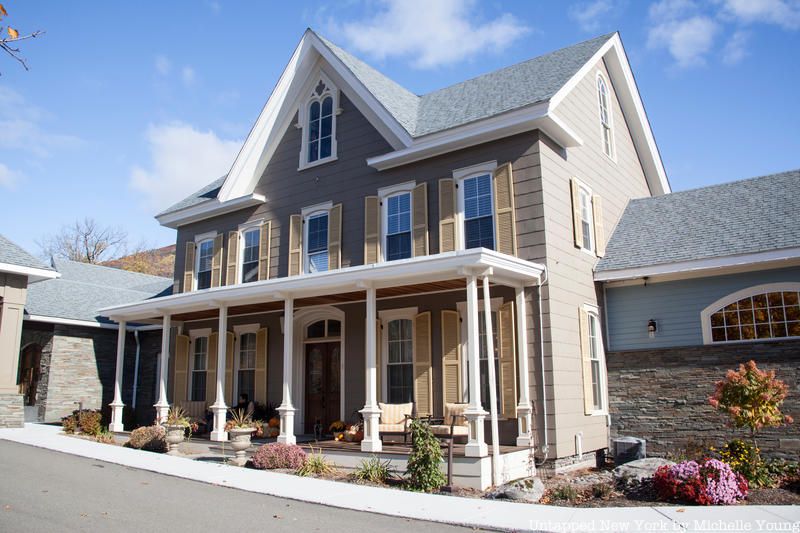
On our stay, the Emerson Resort & Spa in Mount Tremper served as a home base, located less than twenty minutes from Woodstock. The hotel is built on a former farmstead along the Esopus Creek and the facade of the original farmhouse has been restored and incorporated into the modern hotel. The barn and silo, built in 1860, also still remains and has been repurposed as a small shopping and food destination connected to the hotel (with a Guinness Book of World Record holder — more on that in this guide). The Emerson has something for everyone, with full service hotel rooms that have all have a fireplace and a huge deep jacuzzi in an en-suite bathroom, or more rustic cabin options in an Adirondack-style lodge. All the rooms face the creek and the mountain behind, so there’s no bad view in the hotel. During the day, you can check out what the great outdoors and the surrounding towns like Woodstock and Phoenicia have to offer, or take a walk along the nature trail that runs along the creek. The Emerson Resort is also pet-friendly!
There’s also great full-service spa with sauna, steam room, and an outdoor salt water hot tub, along with services like massages, facials, and manicures. The pool is open in the summer months. A farm to table restaurant, Woodnotes Grille, serves up scrumptious dishes with locally sourced ingredients and craft cocktails, and a more casual spot at Ralph’s Cafe, where you can pick up coffee, breakfast pastries, and small bites. Throughout the resort, there is a mission to bring the natural environment in through materials and colors, and you’ll even find an ornate gate that came from Rajasthan at the opening of the spa. Named after writer and poet Ralph Waldo Emerson, you’ll find a book of poems in your room above the fireplace and reproductions of his handwritten papers hanging throughout the hotel.
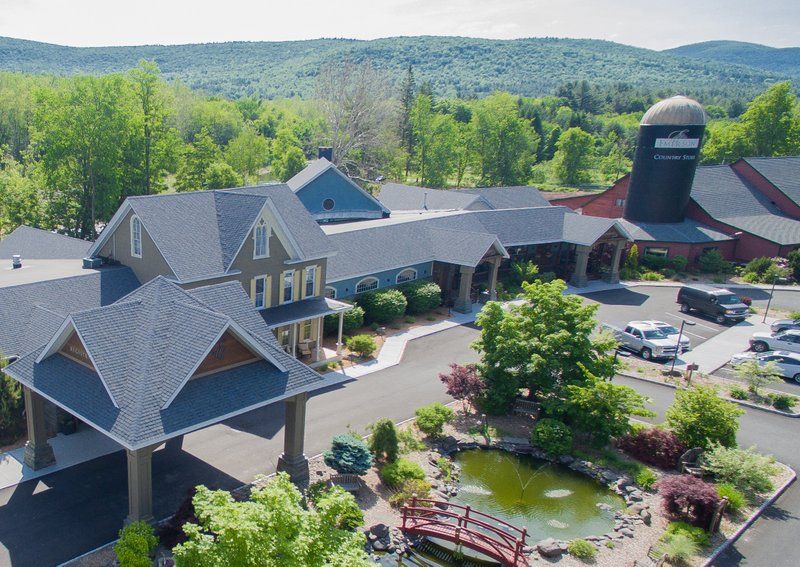
Photo courtesy Emerson Resort & Spa. The World’s Largest Kaleidoscope is located in the silo of the former barn.
The Emerson Resort & Spa is also home to the World’s Largest Kaleidoscope, certified by the Guinness Book of World Records at a whopping 56 feet long and 38 feet in diameter. A popular stop amongst Catkills visitors, the kaleidoscope gets its size from its unique location: inside the silo of the former farm. In keeping with the strong musical and cultural influence of the Woodstock festival, which took place in the Catkills, the kaleidoscope shows an image-based video designed by psychedelic art pioneer Isaac Abrams and his son Raphael, a computer artist. The space, which has a three-dimensional three-mirror system, was designed by an award-winning kaleidoscope artist (there is such a profession), Charles Karadimos. Lest the visual experience not be enough, there is a theater-quality sound system playing a musical score by composer and drummer Gary Burke.
The World’s Largest Kaleidoscope is open seven days a week. Admission is $5, but free for children 11 and under.

New York State, and much of the country for that matter, is criss crossed with abandoned railroad trails that have long been out of use. In recent years there has been a concerted effort to adopt those historic trails for modern day uses and recreational activities. In the Catskills, the old lines of the Catskill Mountain Railroad line are being used for bike rides through the woods. Rail Explorers offer pedal-bike tours over the tracks which have been out of use since 1954.
The tandem bikes seat two to four people and have steel wheels that glide along the old steel railroad tracks, eliminating the need for passengers to steer. Pedaling uphill along “The River Run” trail, which takes you on a bucolic ride along the Esopus River, is made easier by electric pedal assist motors. The journey is an eight mile round-trip with a stop in the middle for the bikes to be turned around and for riders to have a snack. The scenery along the route includes sweeping views of the mountains, the Esopus River and stretches of track enveloped in greenery.
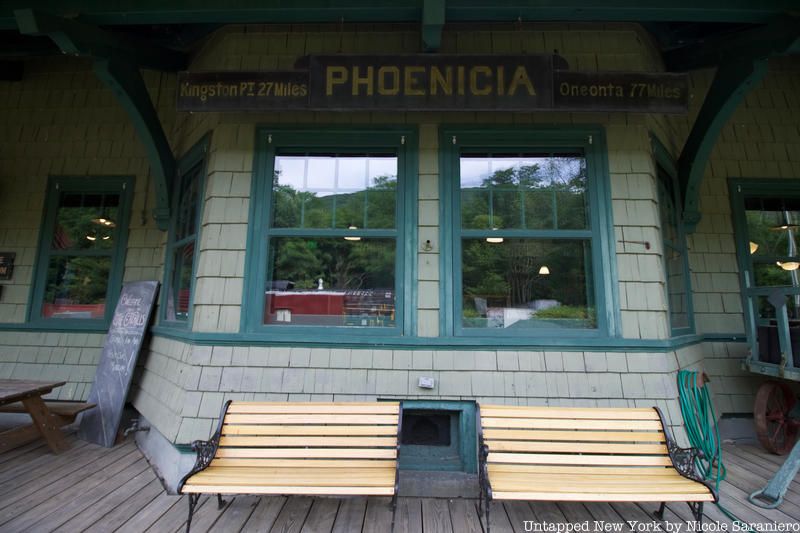
The Empire Explorers ride leaves from the Empire State Railway Museum, located inside the historic Phoenicia Station of the Ulster and Delaware railroad. Built in 1899, it is one of the last stations left along this line and is listed on the National Register for Historic Places. The Railway Museum is also the owner of historic railway cars and locomotives. Along with rotating exhibitions, you can find a miniature train show, vintage cash register, and historic signage inside.
The museum is open on weekends and holidays from Memorial Day through October.
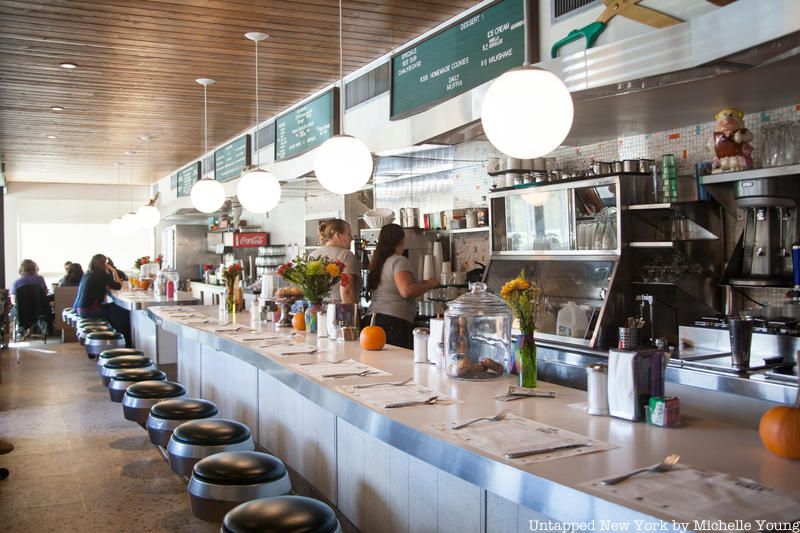
The Phoenicia Diner is not any old roadside diner. While it has the looks of a mid-century gem with soda fountain stools and upholstered booths, it serves locally sourced fare prepared by a team led by chef Michael Hegeman. That means you’ll find dishes like the Local Yokel skillet made of crispy pork belly, blistered tomatoes, chive grits, fresh mozzarella, pesto, and poached eggs, or various dishes made with local trout like the Catkills Poboy or the beef stroganoff made with Hudson Valley braised beef. There’s also a bar which means you can get your mimosas, bloody marys, wine, beer or Cocktails, even a Bourbon milkshake.
Outside, there’s a covered outdoor seating patio with an airstream and live music during the warmer months. To round out the full experience The Phoenicia Diner also has a store (online and in-person) where you can get vintage-inspired items like a Route 28 keychain, a trucker hat, and other apparel.

One of our favorite crazy infrastructure facts is how New York City’s water comes not only from the Catkills, but from reservoirs that were created by drowning numerous towns. One of those is the Ashokan Reservoir, which can store 123 billion gallons of water. It required the relocation of 2,000 people in eight towns and the submersion of four. At its longest, the Ashokan Reservoir measures 12 miles and at its widest, 1 mile, and it is the deepest reservoir for New York City at 190 feet max depth. If you drive along Route 28, which runs parallel to the north side of the Ashokan Reservoir, you will see signs that note the location of the former towns. Turn down Reservoir Road, and you’ll be able to drive across a bridge that traverses the reservoir.
Today, remnants of foundations, walls, and more of the former towns can still be seen, particularly when water levels are lower–often in the fall. You can see some of those archeological finds from bridges and you can also hike and bike along the Ashokan Reservoir Promenade, which runs along a ridge of the reservoir.

Indoor pool, Grossinger’s Catskill Resort and Hotel, Liberty New York. Photo by Marisa Scheinfeld from The Borscht Belt: Revisiting the Remains of America’s Jewish Vacationland.
The Catkills was the home to the “Borscht Belt,” the summer resorts that the Tri-State area Jewish community would decamp to, made famous by the film Dirty Dancing and more recently, The Marvelous Mrs. Maisel. With changing travel patterns, the Borscht Belt resorts closed and became abandoned but many can still be explored today. The closest grouping of resorts on your way up to the Phoenicia area of the Catskills are the resorts that were in the Ellenville, Spring Glen and Greenfield Park area.
Ellenville is an under-40 minute detour off the New York State Thruway (I-87), from which it’s less than an hour up to the Emerson Resort & Spa. Check out these ten abandoned resorts from the Borscht Belt!
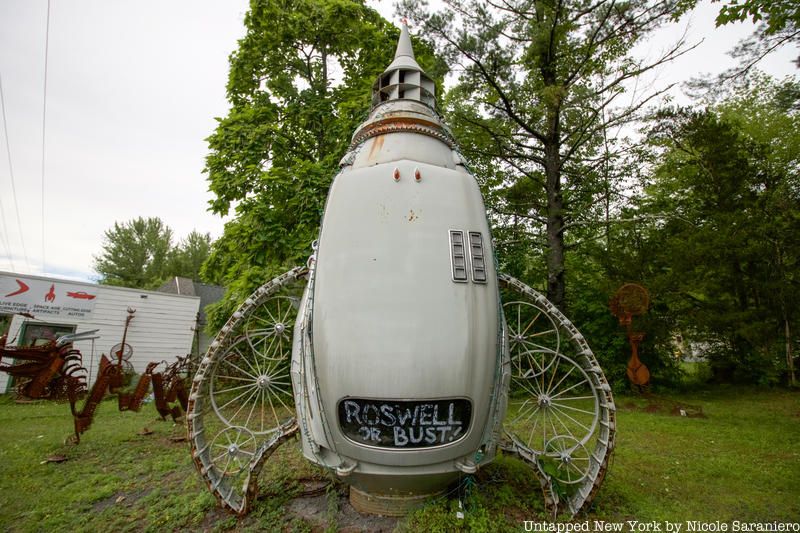
Driving along the scenic Route 28 through the town of Boiceville, New York, you may be surprised to see a shiny silver spaceship and a floating UFO on the side of the road. These eye-catching roadside sculptures are the work of Steve Heller, founder of Fabulous Furniture. The locally owned store was founded by Heller in 1973 and it sells custom, hand-crafted designs made out of wood and other materials. Heller’s quirky artistic style is evident in all of the unique pieces he creates.
As a kid, Heller would look for fallen trees to bring home and carve. When his father died and left a collection of scrap metal, Heller also began to weld. In his furniture making and sculpting Heller uses both skill sets to craft bold, one-of-a-kind pieces. It’s not just furniture that Heller creates, but sculptural works and customized cars as well!
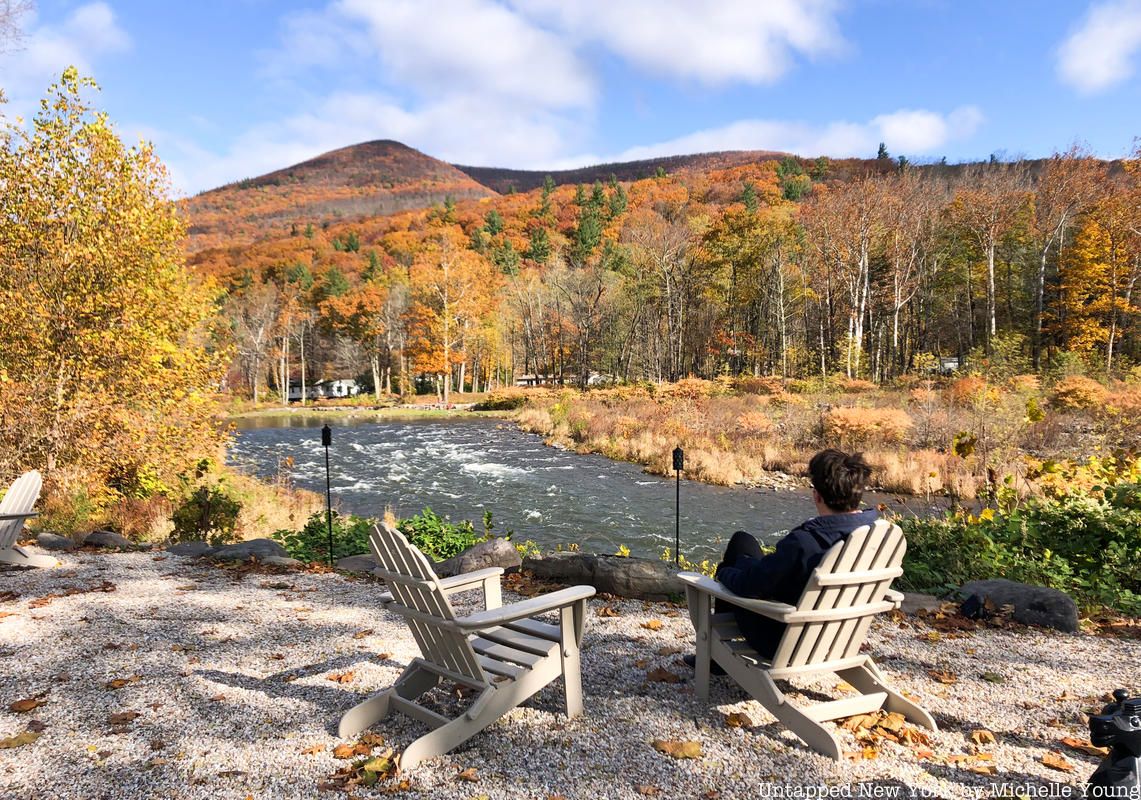
The name of the Esopus Creek comes from the Esopus Indians, a tribe of the the Lenape Indians (who first settled New York). Two wars were fought between the Esopus Indians and the Dutch settlers and the land of the Indian tribes eventually sold to French Huguenot and English settlers. The Esopus Creek runs from Saugerties as a tributary of the Hudson River southwest past Kingston, then turns up north into the Ashokan Reservoir, and runs along Mount Tremper into Phoenicia.
There are a lot of activities you can do on the creek, from the Phoenicia area, including whitewater kayaking, caneing, tubing, and fly-fishing.
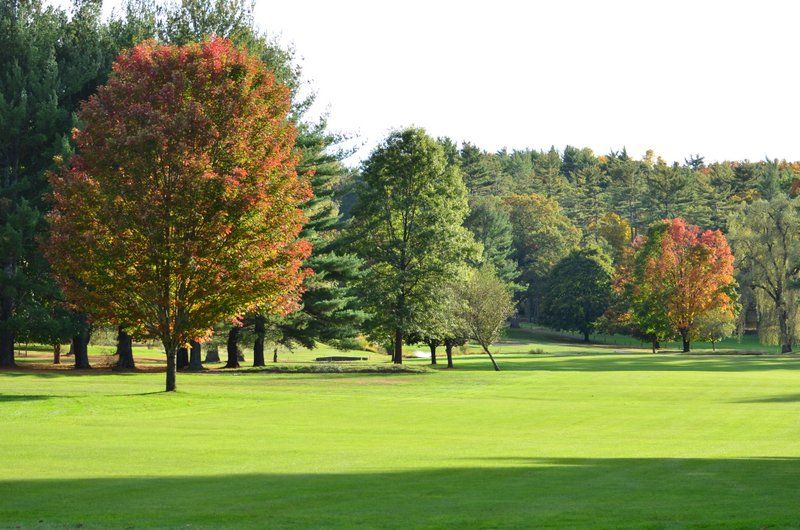
Photo courtesy Emerson Resort & Spa
The town of Woodstock, though not the actual location of the Woodstock Music Festival which was on a dairy farm 40 miles south in Bethel Woods, has a rich artistic history. Considered an “art colony,” Woodstock was the locus point for the Hudson River School of painting, then the Arts & Crafts movement thanks to the Byrdcliffe art residence program, and as a location of the summer program for the Arts Students League in New York City. Woodstock has also attracted writers, musicians and other creatives. There is even an “Artist’s Cemetery “in Woodstock! There are numerous art galleries, small shops, and restaurants to discover.
Finally, another great way to see the Catkills, beyond by rail or by water, as we’ve covered is by air! The Belleyare scenic gondola ride is open from June to Columbus Day, and in the winter is part of the ski mountain there. If you’re interested in ski trips from New York City, check out our guide to the various mountains here.
Enjoy your trip to the Catkills! On a visit to this area, don’t miss the great things to do in Kingston, less than 30 minutes away in the Hudson Valley.
Subscribe to our newsletter